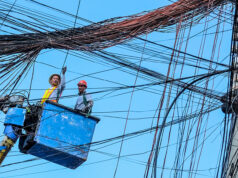POOR FARMING practices have denied Filipino farmers the chance to improve their yield and increase their income, an official of a company promoting sustainable agriculture said.
“Farmers in the Philippines practice poor farming. There is no positive impact of hybrid seeds because the yield is the same,” Patrick Francois Renucci, co-founder of Chen Yi Agventures, Inc., said in an interview last week.
He said improved farming techniques and a change in mentality could vastly improve yield for Filipino farmers.
“Imagine if farmers are equipped with the latest farming machinery, and practice good farming techniques, there’s a huge potential for farming in the country,” he said.
According to Mr. Renucci, Filipino farmers practice bad habits such as using uncertified seeds, putting wrong fertilizer, and bad work ethic, which affect yield and income significantly.
Additionally, he said farmers who use hybrid seeds versus those who use inbred seeds come up with the same yield.
Prices of palay can be lowered further by changing the bad farming habits that Filipino farmers still practice, he said.
“First, they have to do very good farming. When they are able to have a good farm, then we can switch the seeds from inbred to hybrid seeds,” he said.
Chen Yi Agventures President Rachel Renucci-Tan said the company is assisting farmers on how they can improve their productivity and income via Renucci’s partnership program and palay procurement program.
The company has 700 farmers who are under the partnership program, which is based in Alang Alang, Leyte. The program provides low interest loans to farmers. The company also provides the farmers with fertilizer, pesticides, inbred seeds, and planting and harvesting equipment.
Ms. Renucci-Tan said that the company is inviting other farmers and companies to go to Chen Yi Agventures’s facility and learn its techniques.
“We hope that others follow our program so that importation of rice will be lowered,” she said.
The rice comes from the two-hectare Chen Yi Agventures rice processing center (RPC), which is equipped with end-to-end Japanese technology. The company claims that the fully automated center is the most technologically advanced rice processing center in Southeast Asia and is both earthquake- and typhoon-proof.
Palay is stored in several wet bins with temperature control before and after drying by several biomass dryers to keep its freshness. It is then stored in temperature controlled silos.
Chen Yi Agventures invested P1.7 billion in the rice processing center.
“Dalisay Rice” by Renucci won the third best rice in the world during the World Rice Conference last year. It was the first time that the Philippines has received an award as a world-class producer of rice. — Revin Mikhael Ochave



